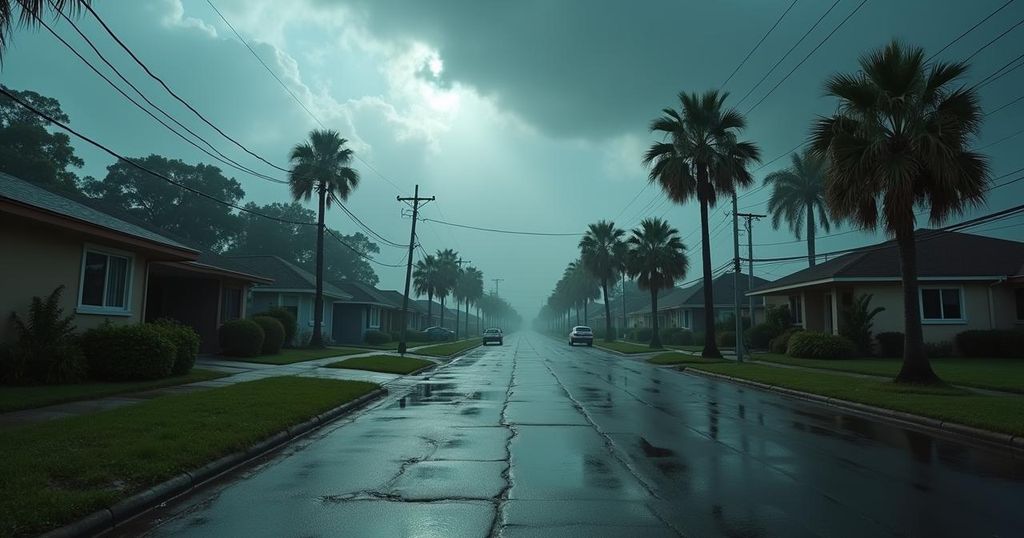Hurricane Milton: A Mindstorm Amid Political Turbulence

Hurricane Milton, originally feared as a catastrophic storm, reduced in intensity as it approached Florida, resulting in minimal damage. The extensive pre-storm warnings issued by authorities have raised concerns about their potential exaggeration, particularly amid political tensions from Trump’s disinformation about hurricane response. As political discourse heats up ahead of the elections, the article reflects on the implications of disaster preparedness and governmental communication.
In recent days, Hurricane Milton made its way towards Florida’s west coast, prompting extensive pre-storm warnings from authorities that some may perceive as excessive, particularly in light of previous hurricanes. The storm, initially categorized as a significant threat due to its status as a category 5 hurricane, ultimately diminished in intensity to a category 3 with winds reaching 120 mph. This reduction alleviated concerns regarding the destructive force of winds but did not entirely mitigate apprehensions regarding storm surges that could inundate low-lying areas. Upon inspecting the affected regions, it became evident that while there was damage—such as overturned boats in Punta Gorda and debris littering streets in Venice—there was no catastrophic destruction. The locals had managed to evade a worst-case scenario, with many attributing their relative safety to heeding evacuation orders. As I traversed through various towns, I observed the noteworthy presence of emergency responders conducting welfare checks. In Casey Key, although storm surges entered homes, residents reported the levels were lower than feared, resembling the aftermath of Hurricane Helene that struck previously. The authorities, examining infrastructure, opened the Sunshine Skyway Bridge, facilitating continued movement to St. Petersburg, where damage primarily affected Tropicana Field. Nevertheless, the specter of the storm raises questions about the accuracy and appropriateness of the warnings issued. The mayor of Tampa issued grim warnings about potential fatalities for those who chose to remain in their homes, sparking debate regarding whether such statements were overly dramatic given the circumstances that unfolded. With conversations circulating regarding whether heightened alerts were perhaps a response to the prior disinformation challenges posed by former President Donald Trump and his allies—who labeled federal relief efforts as inadequate—it opens a dialogue about the role of political rhetoric during disaster preparations. Ultimately, Hurricane Milton did not manifest as the dire threat initially anticipated. Instead, the political landscape in the United States is poised for turbulence as the electoral season approaches, clearly evidenced by the ongoing narratives surrounding governmental actions during times of crisis. The juxtaposition of natural disasters and political strife underscores the complexities and challenges faced by public officials, especially as they prepare for inevitable scrutiny from both the public and political adversaries during significant weather events.
The article discusses the recent effects of Hurricane Milton along Florida’s west coast, contrasting the initial fear surrounding the hurricane with the actual outcomes post-storm. It serves as a critique of the potential over-correction in governmental warnings promoting evacuations, in light of former President Trump’s allegations about federal inadequacies during previous hurricanes. This context is layered with considerations regarding the intersection of environmental disasters and the charged atmosphere of American politics as the 2024 elections approach.
In conclusion, Hurricane Milton, while presenting a frightening prospect, ultimately did not bring about the catastrophic outcomes predicted. The relative safety of those who evacuated serves as a testament to the effectiveness of precautionary measures. However, the implications of how crises are communicated and politicized remain evident, highlighting the interplay between climate emergencies and political narrative strategies as the political landscape in the United States intensifies in anticipation of the approaching elections.
Original Source: news.sky.com








